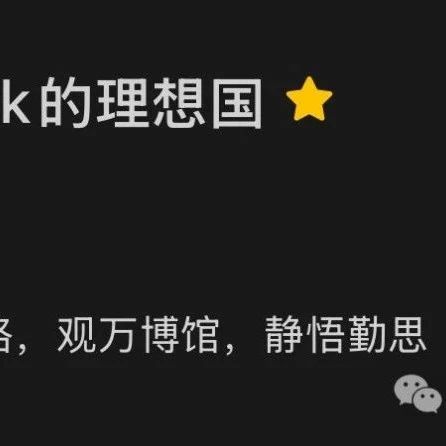Links Between East and West 61 - Seven Years of Blog Writing: A Reflection
Seven Years of Blog Writing: A Reflection
Back in early December, 2017, I decided to open a WeChat blog. At the time, I had no long-term plan for my blog: I had no plan regarding the form, content, audience, of my writings. I could not foresee whether I could run my blog consistently. Now, precisely seven years later, having written over 250 articles totaling about a million words for “Jack’s Utopia,” I can say that at least “yes, I have managed to keep the blog running no matter how my personal or academic life has changed.”
But perhaps my blog's statistics are by no means the story's protagonist or the plotline of this incredible, ongoing writing journey. It is what I have written that speaks volumes. In my blog, many articles discuss the meaning of writing to me, but no entry elucidates some nuanced elements in my relationship with words. In this article, I hope to thus jump back and forth in time and unveil a deeply personal feeling I have developed over the years to achieve my utopia.

My blog started as a place to document my Chinese homework. In fifth grade, my Chinese teacher assigned weekly unlimited, creative writing tasks that I found great joy completing. Instead of letting all my words eventually be thrown away with my diary book, my parents and I created this blog to store my writings. My first article was about Christmas – strange experiences I witnessed or underwent during this holiday. I also wrote about my teachers and life in a new school after this piece.
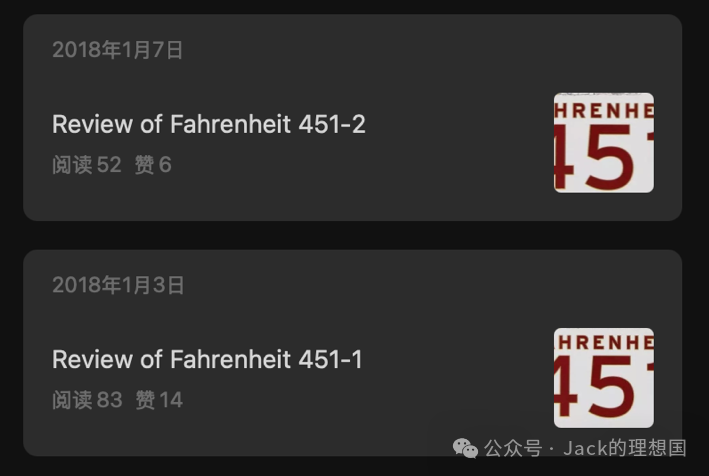
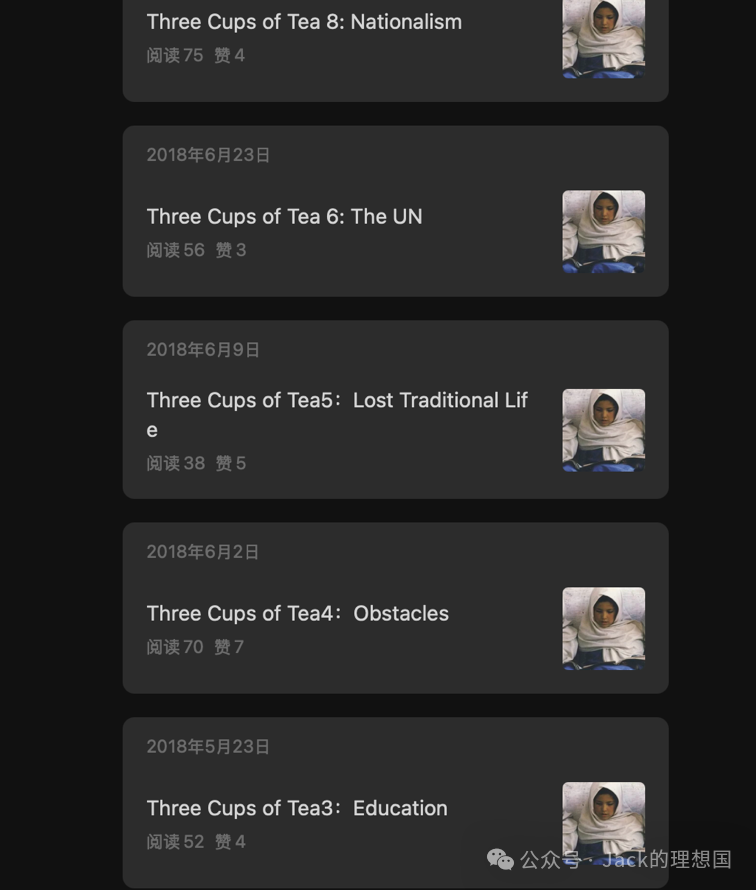
Finishing each week’s Chinese writing homework allowed me to develop a habit of writing down anything that interested me. So by early 2018, I decided to experiment with writing book reviews for some of my favorite works: Lord of the Rings, Fahrenheit 451, The Giver…I continued to write book reviews even much later when I started devouring non-fiction works such as Sapiens or The Republic.
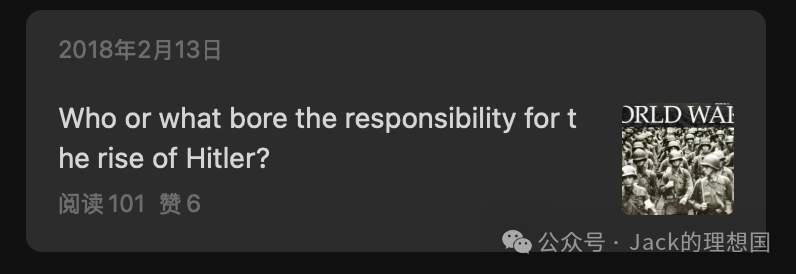
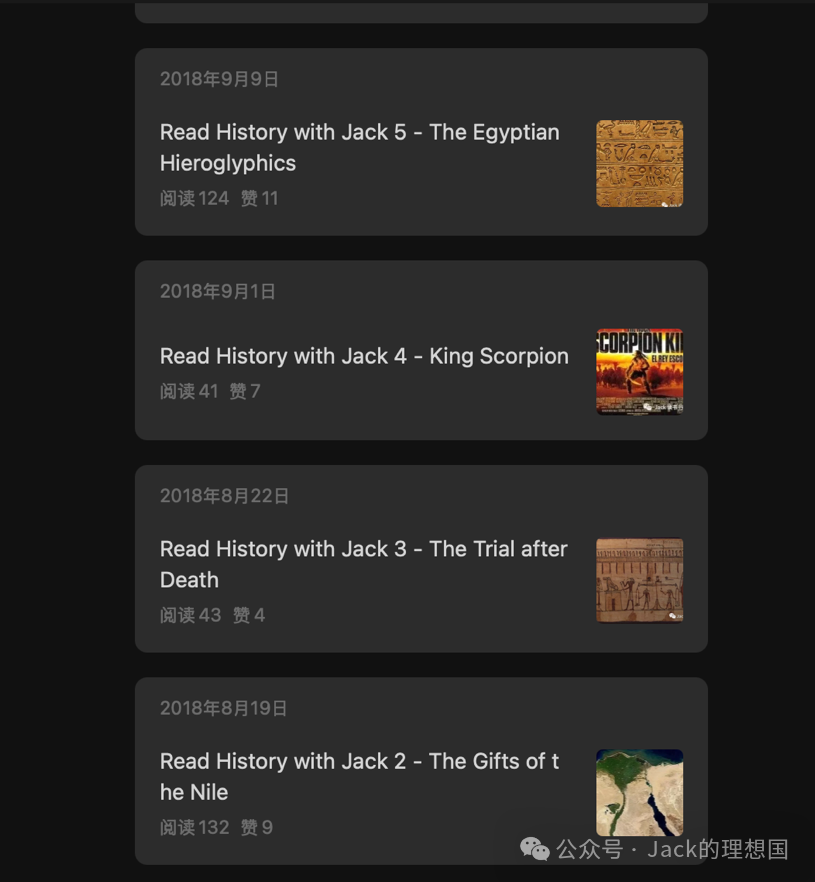
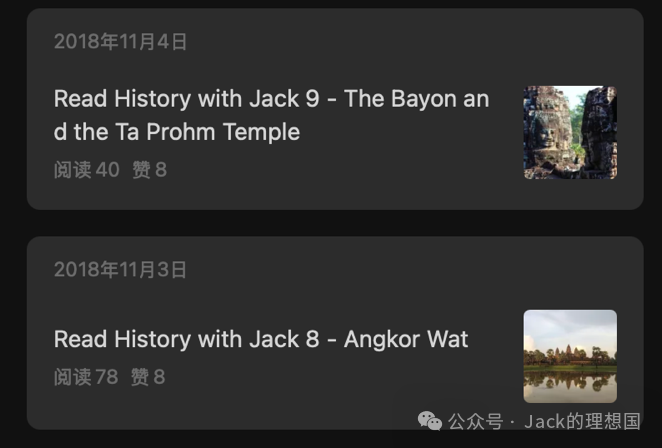
Simultaneously, in fifth grade, I came into contact with the subject of history. The nature of history – a collection of stories of people – immediately piqued my curiosity. To fulfill my eagerness to document down my readings of the stories of other individuals, the series Read History with Jack was born. The first article bore the title: “Who or What Bore the Responsibility for the Rise of Hitler?” And from that point onwards, there is no stop. Ancient Egypt’s burial traditions, Angkor Wat’s hidden epics, the Minoans’ sudden and tragic fall to oblivion…My writings for Read History with Jack took me across time and space into the vivid lives of countless numbers of people: The Pharaohs, the Chinese diplomats sent to the Cambodian kingdoms during the 10th century, the fishermen who witnessed the tsunami caused by the volcanic eruption near Crete…
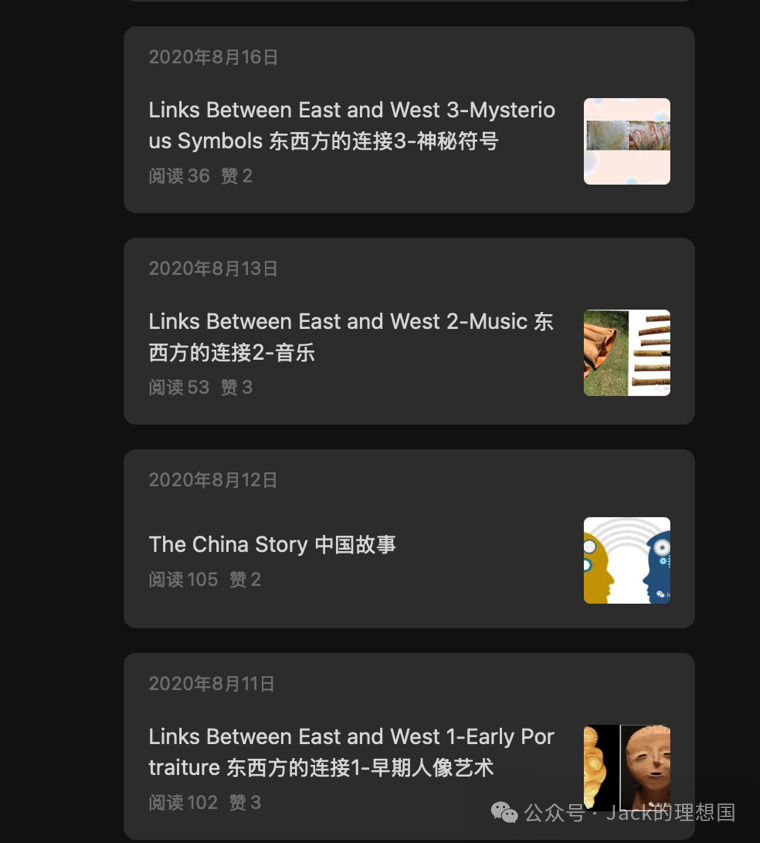
In 2020, when the pandemic hit, I found more time and opportunities to search the internet for inspiration. It was then when I discovered the documentary series called Civilizations, which discusses how past cultures respectively contributed to a same historical motif, such as art. Inspired by this innovative approach to juxtapose historical cultures, I started my own writing experiments by opening a new series called Links Between East and West. By comparing how various cultures viewed the phenomenon of death, created portraiture art, pursued happiness, and many more topics, I came to the realization that the world has been much more connected. Links Between East and West pushed me to think deeper into the dynamics, principles, and patterns guiding interactions between different cultures – a research direction that has since permeated my research.
Throughout all these years, one facet that has truly made me value my blog so much is its ability to let me visually see my growth as a knower and writer or explorer. While photos can also portray my change as a person, my blog is an archive that has allowed me to review my changes in such greater detail and vividness. Consider, for example, how my historical writing style and content have grown each year.
This is an excerpt from my first Read History with Jack essay, written in early 2018:
“After the war, America faced the horrible Great Depression, which affected Germany as well. Germany was under heavy pressure from the war payments and the Depression. Citizens were starving, and the numbers of unemployment were rising steadily every day. People needed help and supplements. Hitler gave some speeches to the people that promised a change in Germany’s poor economy. Both the speeches and the book persuaded the citizens to vote for him in elections. Although Hitler did threaten some people to vote for his party, some people voted through their own free will. He ultimately became Chancellor of Germany”
The language is quite descriptive, and I only tried to portray history as a story.
Now, here’s an excerpt from a 2019 piece about the rise and fall of empires:
“Culturally, after placating civilians, an empire could strengthen its cultural foundations after placating civilians. Laying vital cultural foundations not only can create a tight imagined order which everyone can follow but it can also be passed down to posterity. For instance, the Zhou devised“The rules for conducting ceremonies and composing music appropriate for different occasions”as the model system of Chinese rites and music culture, therein laying a cultural cornerstone for the code of etiquette of subsequent successive dynasties.”
There was much less description and more analytical language than a year before. I began to provide evidence to outline important factors that could contribute to the rise of the Chinese Zhou state.
A year later, in 2020, I wrote a piece about the history of globalization, which ended with this paragraph:
“When the Cognitive Revolution started in 70000 years ago, early human societies already started to try and come together. Indeed, looking back, the arrow of history points toward unification, rather than division…Money is the most prevalent and effective communication network ever devised by people because it can bridge almost any cultural gap. Even strangers can cooperate based on a common currency. Money, through creating intricate structures commercially, has led globalization to occur on a far vaster scale…From an emotional perspective, as long as we share our most basic emotions and hopes with each other, globalization, albeit encountering unexpected obstacles, will always proceed.”
Not only did I identify the creation of money as a factor that created globalization, but I also started to derive historical patterns: The arrow of history points toward unification.
As I consistently wrote in my blog, my writings gradually prodded me to consider more profound questions regarding historical figures and their stories that pertain to moral philosophy. In 2021, for instance, I wrote:
“Looking across history, there are many cases that suggest that politicians have broken those moral rules to accomplish some grander goal for the country’s politics or nation. For example, Julius Caesar is renowned for his tough and unforgiving mentality. Throughout his political career, he undoubtedly broke many moral rules…During his conquest of Gaul, he is estimated to kill at least 1,430,000 Celts and Germans in combat…Caesar certainly was not a hero to be admired morally. However, his unrelatedness and his resolute played a major role in keeping the Roman realm together despite constant mayhem within when the Republic collapsed and the Empire was built up. Without him, the Romans could not have been able to construct such a brilliant and breathtaking empire that spanned three continents at its heyday. From this example, we can see that sometimes, breaking moral rules can be crucial for the general well-being and final success of the state. The sacrifices of having a torn-apart empire far outweigh the sacrifices of violating those rules.”
Building on a trend to explore the intricate complexities of the history subject, my history writings for my blog now encompass an analysis and discussion of unconventional factors. For instance, in a recent essay about the collapse of civilizations, I wrote:
“Aside from the inherent complexity of civilizations, another ultimate cause of civilizational collapse is the decline of social cognition and the decreasing ability to solve critical issues. The anthropologist Joseph Tainter champions this view with his theory about the “diminishing returns on investments in social complexity,” first formulated in the late 1980s. Tainter claims that when societies solve social challenges, such as a shortage of energy, they invest efforts to develop new layers of bureaucracy, infrastructure, or hierarchy, complicating the social structure. There is a positive relationship between social complexity and its administrative costs, contributing to an eventual societal collapse.”
Over the years, even from this small selection of examples, one can see my growth as a writer and student of history. Of course, when I revisit an article written six, seven years ago, I always marvel at how “cute” and yet “wonderous” my language style and ideas used to be. Looking back at my past articles reminds me that there is always so much more space for future explorations and never to limit what I might write about. My blog informs me that the journey of writing I began seven years ago will be a lifelong endeavor to establish my perspectives and hone the strength of my voice.
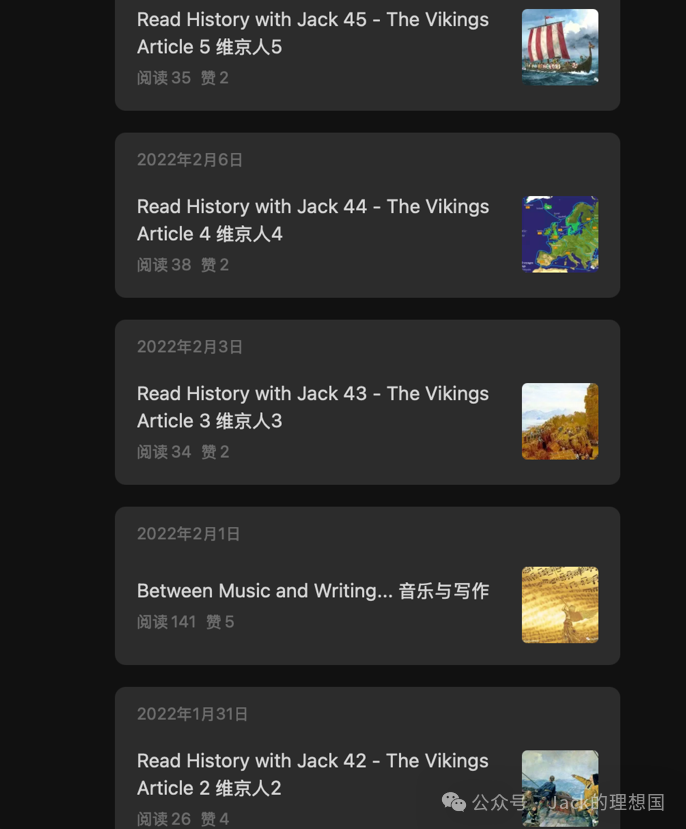
Aside from making my growth tangible, my blog is my land of freedom. I have the freedom to question anything, to be guided by my instinctive curiosities. History has always fascinated me. Why did the glorious Roman Republic come to an end? Were Vikings more than marauding seafarers, steering their longboats through the choppy waters of the Atlantic Ocean? Why could there be a scientific golden age in the authoritarian Islamic Caliphate? How complex was the age of reform in early modern China? How can we understand the turbulent time of the World Wars?...My blog provides the space for all these questions to be answered and more questions to be raised. Three years ago, a documentary about the complex yet intriguing way of Viking life prompted me to immediately question the widespread view that they were cruel, marauding seafarers. I took my questions to my blog and wrote a series of short essays about how the Vikings impacted Europe's political, economic, and cultural dynamics during the Viking Age. In an environment where grading criteria and specific instructions often restrict writing, my blog is thus such a unique niche to create truly liberated writing that calls to my most intrinsic curiosities.
I have the freedom to invent in my blog. Some of my happiest moments over the past seven years have been when I suddenly come up with a novel approach to a topic. I attempted to implement so many crazy ideas in my blog: Writing an epilogue to Lord of the Rings, comparing how different philosophers in Europe and China conceived utopias, imagining my actions if I owned the Ring of Gyges, using AD-AS economic theories to analyze why British colonialism dealt more damage to its domestic economy, comparing Lisztomania and the craze over Taylor Swift, interpreting Beethoven’s “Moonlight” Sonata as a film…I let my creativity fly! My blog has allowed me to understand human thinking and creation are never far away from each other, and that a piece of knowledge can always be connected to other pieces in different contexts and times.
My blog has also evolved into a vessel to pour in my emotions, a silent listener that takes in my varied expressions. Through my writing, sometimes I realize I am not alone. For example, it wasn’t long until I realized that the historical figures that I idealized, like Alexander the Great, Napoleon, and many others were deeply flawed people, like every one of us, whose personal ambitions ruined the lives of countless “smallfolk” who had little choice in the matter. The Silver Shield veteran who spent twenty years fighting for Alexander the Great and his successors, who finds himself dying on some battlefield a thousand kilometers from home, would likely be unable to articulate what choices ultimately led him there. So, he dies, alone and in pain, in a puddle of his own blood and guts, in a place the name of which he doesn’t know. Knowing my human nature does not belong just to me, but to millions of individuals, great or small, often serves as a stabilizing agent, which I inject into myself by putting down words.
At the end of the day, “Jack’s Utopia,” what is the utopia I am building? It is a world of knowledge, emotions, and memories. Knowledge has been portrayed too often as objective and cold facts. I hope to link the knowledge I seek and the thoughts I produce with personal emotions, moments of excitement, wonder, and curiosity, encapsulating them in my blog articles. So, when I look back after many years, I am not just reading my articles. I am feeling and reliving the emotions, the drive, the incentive I poured into every composition and every word.
《写于“Jack的理想国”运营七年的一篇反思》
2017年12月初,我决定开设一个微信博客。当时,我并没有为博客制定任何长期计划:没有对形式、内容、受众的明确规划,也无法预见自己是否能坚持写作。然而,七年后的今天,我在“Jack的理想国”上发表了超过250篇文章,总计约一百万字,我可以自豪地说:“无论个人生活或学术生涯如何变化,我始终坚持经营我的博客。”
但或许,博客的统计数据并不是这个非凡、仍在继续的写作旅程的主角或核心情节,真正重要的或许是我所写的内容。在我的博客中,有许多文章探讨写作对我的意义,但却从未真正细腻地阐述我与文字之间的关系。在这篇文章中,我希望能够穿越时空,揭示多年来我对文字发展出的一种深刻而私密的感受,以实现我的理想国。

还记得,我的博客最初是用来记录我的中文作业的。五年级时,我的语文老师布置了每周不限题材的创意写作任务,我非常乐于完成这些作业。为了不让我的文字随着日记本的弃置而被遗忘,我和父母共同创建了这个博客,保存我的作品。我的第一篇文章写的是圣诞节——一些在这个节日期间目睹或经历的奇怪经历。随后,我又写了关于我的老师或转学到新学校后的生活的文章。
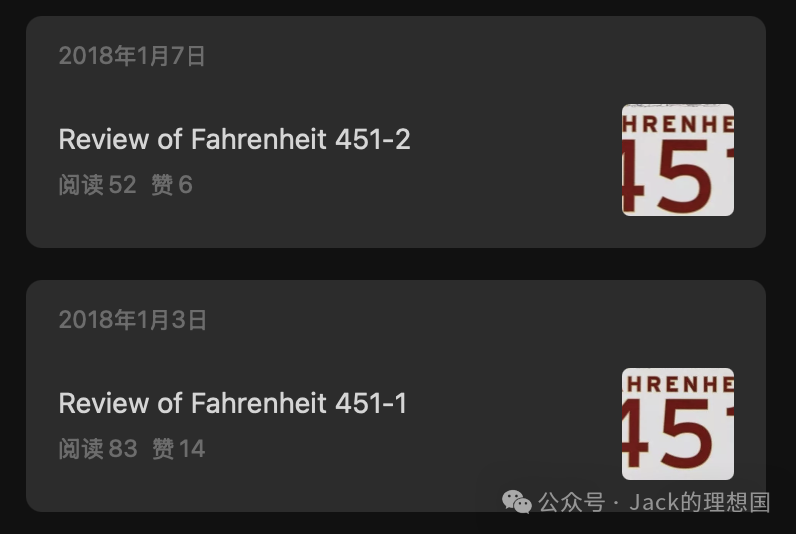
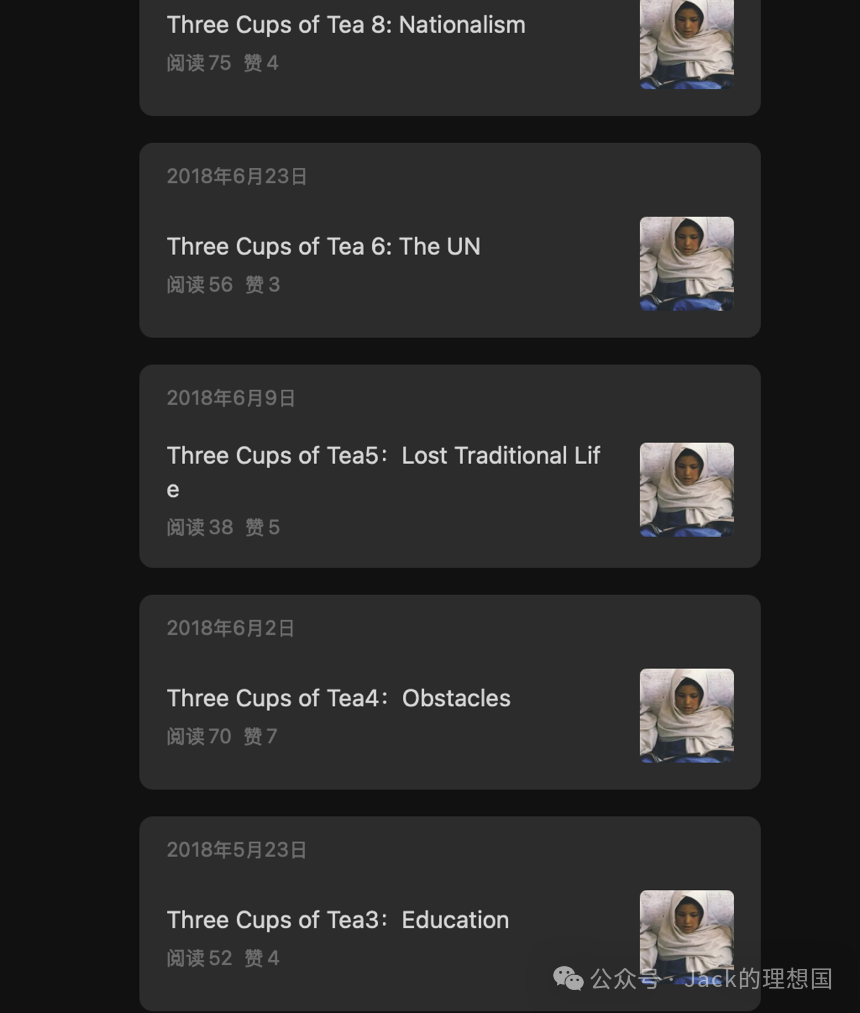
完成每周的中文作业让我养成了记录一切感兴趣事物的习惯。因此,到2018年初,我开始尝试为一些自己喜欢的书籍写书评:《魔戒》、《华氏451》、《记忆传授人》……后来,当我开始阅读非虚构作品如《人类简史》或《理想国》时,我仍然继续写书评。
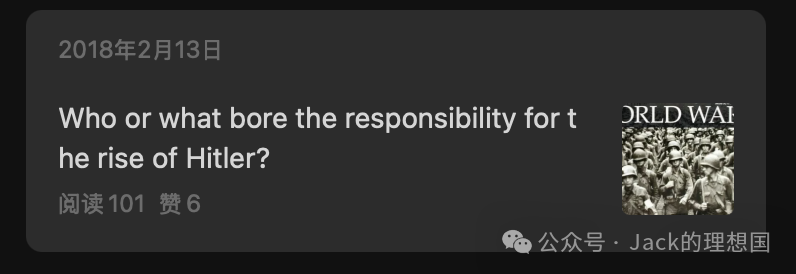
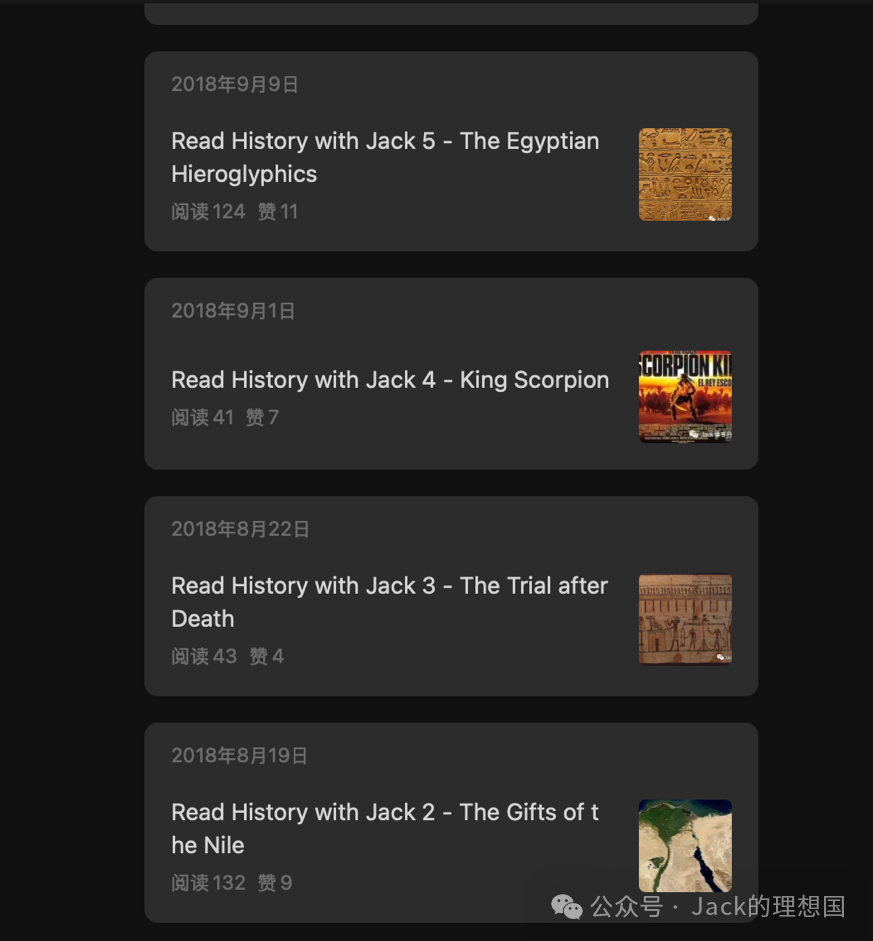
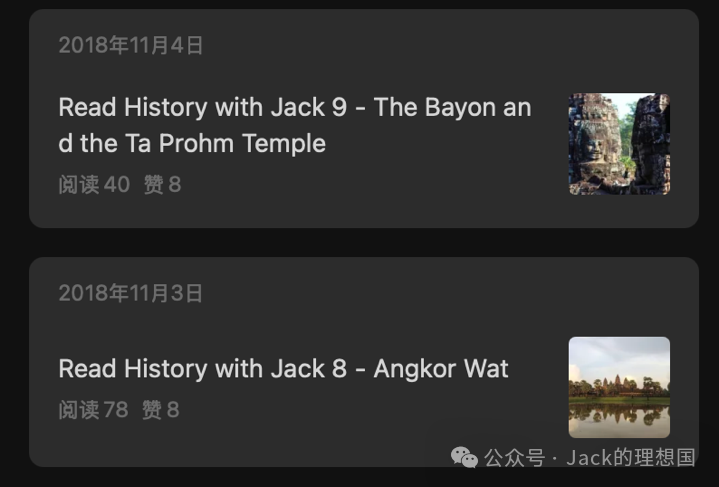
与此同时,在五年级时,我接触到了历史这门学科。历史的本质——一个个关于人的故事——立即激起了我的好奇心。为了记录我阅读到的这些人物故事,“跟着Jack读历史”系列诞生了。第一篇文章的标题是《谁或什么应对希特勒的崛起负责?》。从那以后,这个系列便没有中断过。从古埃及的葬礼传统到吴哥窟隐藏的史诗,再到米诺斯文明突然而悲剧性的消失……在“跟着Jack读历史”系列中,我的写作穿越时空,走进了无数生动的人物生活:法老、10世纪被派往柬埔寨王国的中国外交官、目睹克里特岛附近火山喷发引发海啸的渔民……
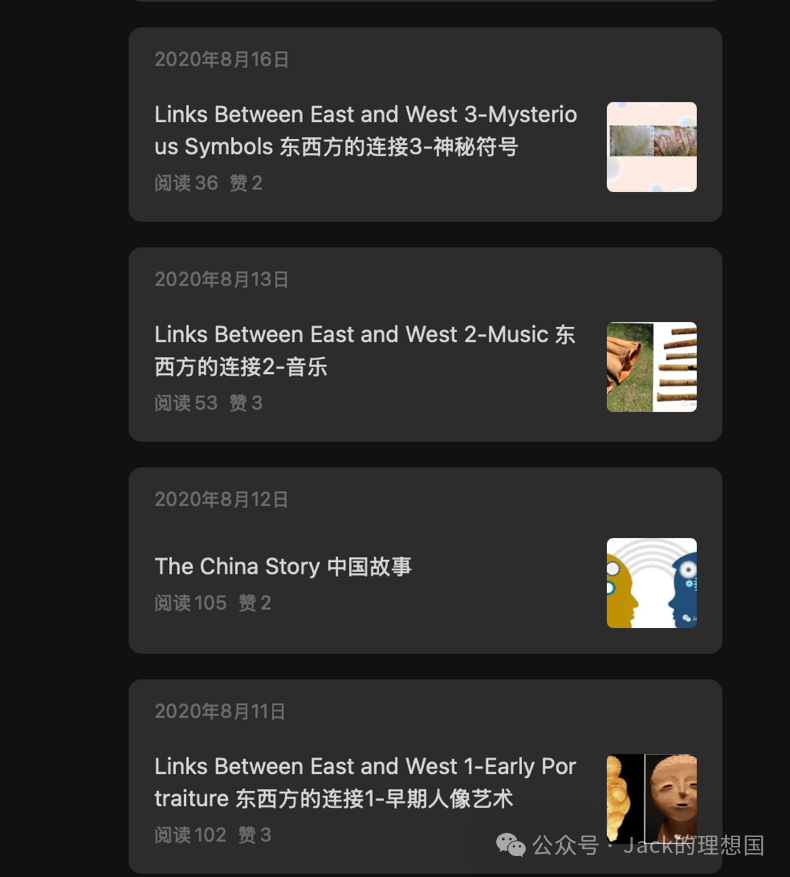
2020年,当疫情爆发时,我有了更多时间和机会在网上寻找灵感。那时,我发现了一部名为《文明》的纪录片系列,探讨了历史上不同文化如何分别对相同的主题(如艺术)作出贡献。受这种创新方法的启发,我开始了自己的写作实验,开设了名为“东西方的连接“的新系列。通过比较不同文化如何看待死亡现象、创作肖像艺术、追求幸福等主题,我意识到这个世界的联系远比我们想象得更加紧密。“东西方的连接“促使我更深入地思考不同文化之间互动的动态、原则和模式,而这种思考方向后来也贯穿了我的研究工作。
多年来,我对博客最珍视的一点是,它让我能够直观地看到自己作为一个知识探求者和作家、探索者的成长。照片可以记录一个人外貌上的变化,而我的博客则是一座档案馆,能让我以更大的细节与生动性回顾自己的成长。比如,看看我的历史写作风格和内容是如何每年都发生变化的。
这是2018年初我第一篇“跟着Jack读历史“文章中的一段节选:
“战后,美国面临了可怕的大萧条,这也影响了德国。德国承受着沉重的战争赔款和经济大萧条的压力。公民们在饥饿中挣扎,失业人数每天都在稳步上升。人们需要帮助和补给。希特勒向人民发表了一些承诺改变德国经济状况的演讲。无论是演讲还是书籍都说服了市民们在选举中投票给他。尽管希特勒确实威胁了一些人投票给他的政党,但也有一些人是出于自己的意愿投票的。他最终成为德国总理。”
这段文字描述性很强,我只是试图将历史讲述成一个故事。
再看2019年写的一篇关于帝国兴衰的文章中的节选:
“从文化上来说,在安抚平民之后,一个帝国可以通过加强其文化基础来进一步巩固统治。奠定重要的文化基础不仅能创造一个紧密的想象共同体,还能将这些文化传递给后代。例如,周朝制定了‘典章制度’,即适用于不同场合的礼乐规则,为后续朝代的礼乐文化奠定了文化基石。”
这时我的语言比之前少了很多描述性,而是更加分析化。我开始用证据来阐述有助于周朝兴起的重要因素。
一年后,2020年,我写了一篇关于全球化历史的文章,结尾是这样的:
“当7万年前认知革命开始时,早期的人类社会就已经尝试走向联合。事实上,回顾过去,历史的箭头指向的是统一而非分裂……货币是人类发明的最普遍、最有效的交流网络,因为它可以弥合几乎任何文化鸿沟。即使是陌生人也可以基于共同的货币进行合作。货币通过商业上的复杂结构促成了更大规模的全球化……从情感的角度来看,只要我们彼此分享最基本的情感和希望,全球化尽管会遇到意外的障碍,但始终会向前推进。”
这段文字不仅识别了货币作为全球化推动因素的作用,还开始从中推导历史模式:历史的箭头指向统一。
随着我在博客中持续写作,我的文章逐渐促使我去思考关于历史人物及其故事的更深层次的问题,这些问题往往与道德哲学相关。例如,在2021年,我写道:
“纵观历史,有许多案例表明,政治家们为了实现国家政治或民族的更高目标,曾打破那些道德准则。例如,尤利乌斯·凯撒以其坚韧和毫不妥协的心态而闻名。在他的政治生涯中,他无疑违背了许多道德准则……在征服高卢期间,据估计他在战斗中至少杀死了1,430,000名凯尔特人和日耳曼人……凯撒当然不是一个值得在道德上钦佩的英雄。然而,他的果断和坚定在维持罗马王国统一、应对共和时期的持续混乱,以及帝国建立的过程中起到了至关重要的作用。没有他,罗马人可能无法建立起那个在鼎盛时期横跨三大洲的辉煌帝国。从这个例子中我们可以看到,有时,打破道德规则对于国家的整体福祉和最终的成功可能是至关重要的。拥有一个四分五裂的帝国所带来的牺牲,远远超过了违反那些规则所付出的代价。”
基于探索历史学科复杂性的趋势,我的博客历史文章现在涵盖了对非传统因素的分析和讨论。例如,在最近一篇关于文明崩溃的文章中,我写道:
“除了文明本身的复杂性之外,文明崩溃的另一个根本原因是社会认知的下降和解决关键问题能力的减弱。人类学家约瑟夫·泰纳(Joseph Tainter)以其关于‘社会复杂性投资回报递减’的理论支持这一观点,该理论最早于20世纪80年代后期提出。泰纳认为,当社会解决社会挑战(例如能源短缺)时,会通过增加新的官僚机构、基础设施或层级结构来进行投入,从而使社会结构更加复杂化。社会复杂性与其行政成本之间呈正相关关系,而这种复杂性最终会导致社会的崩溃。”
多年来,即使从这些小小的例子中,也可以看出我作为一名历史写作者或学习者的成长。当然,当我回顾六、七年前写的文章时,总会对自己当时的语言风格和想法感到既“可爱”又“奇妙”。回看过去的文章让我意识到,未来的探索空间总是无穷无尽,不应限制自己可以写作的内容。我的博客告诉我,七年前开启的写作之旅将是一项终生的努力,用以确立我的角度,并打磨我的观点。
博客不仅让我能看到成长,还成为了我的自由天地。我可以自由地质疑任何事物,随心所欲地探索历史中的各种问题。比如:辉煌的罗马共和国为何走向灭亡?维京人真只是抢劫掠夺的航海者吗?专制的伊斯兰哈里发为何能迎来科学的黄金时代?中国近代改革浪潮究竟有多复杂?两次世界大战的动荡时期我们如何理解?……博客为所有这些问题提供了空间,既解答已有的问题,也引发新的问题。写作让我明白,人类的思维和创造永远不会相隔甚远,每一块知识都可以在不同的语境和时代中找到联系。
我的博客还让我尽情发挥创造力。在过去七年中,一些最快乐的时刻就是我突然想出一个全新的视角或方法去探索某个主题。我尝试了许多疯狂的点子:为《魔戒》写一个后传,比较欧洲和中国不同哲学家对乌托邦的构想,想象如果我拥有“盖吉斯之戒”会怎么做,用AD-AS经济理论分析英国殖民主义对其本土经济的破坏性,比较李斯特狂热和当下对泰勒·斯威夫特的热爱,解读贝多芬的《月光奏鸣曲》仿佛它是一部电影……我让自己的创造力自由翱翔!博客让我认识到,人类的思考与创造从来不远,而每一块知识总可以在不同的背景和时代中找到新的联系。
我的博客也逐渐成为倾注情感的容器,它是一个无声的听者,承受者我的种种表达。通过写作,有时我意识到自己并不孤单。比如,我很快意识到,那些我曾理想化的历史人物,如亚历山大大帝、拿破仑等,实际上与我们每个人一样,都有着深刻的缺陷。他们的个人野心毁掉了无数“平民”的生命,这些普通人几乎没有选择的权利。例如,一位为亚历山大大帝及其继任者服务了二十年的银盾老兵,可能最终在离家千公里的某个战场上死去。他孤独而痛苦地倒在自己的血泊中,甚至不知道自己所在之地的名字。通过这些文字,我感受到人性并不只属于我,而是属于成千上万的个体,无论伟大与渺小。这种认知常常成为一种稳定的力量,而我通过写作将它注入到自己的内心。
到最后,“Jack的理想国”——我正在构建的理想国究竟是什么?它是一个知识、情感和记忆交织的世界。知识常被描述为客观而冰冷的事实,而我希望将我所追求的知识和所产生的思想,与个人情感、兴奋、好奇、惊叹的瞬间联系起来,并将这些情感融入到我的博客文章中。这样,当多年后回首,我阅读的就不仅是我的文章,而是重新感受、重温那些驱使我创作的情感、动力与灵感。
- 本文标签: 原创
- 本文链接: http://www.jack-utopia.cn//article/648
- 版权声明: 本文由Jack原创发布,转载请遵循《署名-非商业性使用-相同方式共享 4.0 国际 (CC BY-NC-SA 4.0)》许可协议授权
